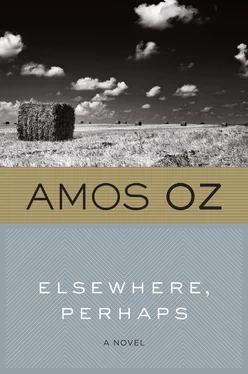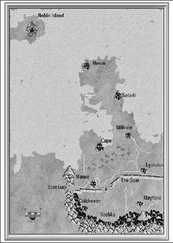"Grandma."
She doesn't move. He straightens up stiffly. Fingers the hair on his shoulders and his chest. Crawls in his underwear between the white sheets. Turns his face to the wall. He tries to return to his musings and even murmurs softly: Well then, Turquoise, the fishermen.
Sleep comes on the man suddenly. Like an ax blow. Like a woman.
The thirties — unforgettable years, years we shall boast of for ever! Metsudat Ram: a tiny terrified encampment, lost in an empty expanse, braving the menacing mountains. A wooden tower, a double barbed-wire fence, dogs barking at the moon. Gray tents and dirt tracks, with billows of dust, four parched huts, scorched tin roofs, brackish, reddish water, smelling rusty in the common showers. A tumble-down shack with a few rickety tables. Frail saplings drooping in the heat. Tormented nights, filled with wild sounds, bathed in harsh moonlight, swarming with horrible movements. Strange noises from the Arab village nearby, the smell of smoke, damp vapors, our cheerful shouting in the middle of the night, wild dancing, party songs full of joy, full of sorrow, full of longing, a mixture of unbridled ecstasy and desperate orphaned sobbing.
Eva.
The time: two years after she first arrived in Reuven's tent. Almost two years after the death of Aaron Ramigolski, our first victim. That autumn we bought a small truck. The first. And at the end of the festival of Hanukka we made our first expedition to Haifa, to see a production of the Habima theater company. Not all of us, of course, but fifteen of our members, selected by ballot. Fifteen was the total number the primitive vehicle would carry. Eva and Reuven went, and Fruma and Alter Rominov, and Herbert Segal, and Mundek Zohar, our first driver, took the wheel. There were guns hidden under the driver's seat, even though there hadn't been any trouble lately.
It was a clear winter's day. The roads were washed and watered. Patches of bright green flanked the road in places. The sky was a rich, deep blue. And there was the excitement of the new truck. They sang songs and joked. They even made fun of serious things.
After the performance, back in the ice-cold lorry, Alter Rominov opened a discussion.
"Here we are building a new world, living a completely new life, and Habima still keeps harping on these ghetto themes."
The road was dark. The sky overcast. Not a star to be seen.
In the discussion that ensued, Herbert Segal took a similar stand to Alter Rominov, only, of course, he expressed himself in different words. (It was Herbert's remarks on that occasion which gave rise to his article on culture, still remembered among our veterans for the repercussions it raised.) Reuven disagreed with Herbert. There is a necessary connection between our new life and the old life in the ghetto.
Eva, not usually one of our ardent debaters, took part for once in the discussion. She raised her head from Reuven's shoulder and uttered a single sentence, which could only with difficulty be connected with the subject under discussion.
"It's the simple, great themes which ought to be portrayed, like passion and death," she said, and laid her head once more on Reuven's shoulder.
At this point the conversation was in danger of becoming heated, since no one, not even Reuven, was likely to let these words of Eva's pass unchallenged. Feelings ran deep in many hearts in those days, and Eva's warm, languid voice naturally excited deep feelings. But, just in time, a hoarse shout came from the driver's seat:
"Don't talk, friends, sing!"
Two or three voices responded with a burst of song, which smothered the conversation and soothed the passions. We were young in those days, and we put our hearts into our singing. So we sang, and Eva sang with us.
As we approached the valley the darkness became deeper, the roar of the engine more intense. The wind howled in the flapping canvas. Songs of joy gave way to songs of sad longing. Suddenly we ran into a torrential downpour. Jets of icy water came in through the opening at the back, and the passengers huddled deeper inside. Eva laid a pale hand on Reuven's knee.
"You'd think we were somewhere else," she whispered.
"A ghastly journey through a night of horrors," Herbert Segal said, to himself rather than to the others. And Alter Rominov, as usual, made a weak joke:
"Noah's ark. And we're the animals."
Alter's voice did not sound jocular, though.
Eva whispered to Reuven.
"Do you remember? Do you remember?"
And Reuven, the gesture is etched permanently in his memory, shrugged his shoulders.
The brakes screeched desperately as the road fell steeply down into the valley. The yellow headlights peered vainly through the rain and the fog.
Eva whispered.
"On a night like this I'd like to die."
Reuven shrugged his shoulders again. He was twenty-four, a pure-hearted, bright-eyed youth. What did his bright eyes see, what could they see when they looked at Eva? A girl with a romantic imagination. Fond of sickly stories of love-smitten heroes dying young of consumption. Of Gothic horror stories of forests and wizards and chaste maidens offering themselves to the fierce tempest. He was a pure-eyed youth. How could he imagine.
"It's cold and wet," Alter Rominov said. "We might get home on a gondola, we certainly won't get there in this truck." He was the only one to laugh at his joke.
Podolski said:
"It's all right. We finished sowing a fortnight ago. So what's the matter. It's good."
And Herbert Segal, under his breath:
"The tents will be carried away."
Fruma opened her mouth for the first time:
"When I was a little girl, I thought rain was the nicest thing in the world. And it's true when you've got a nice warm house. But in a tent…"
Reuven put his scarf round Eva's shoulders. She might catch cold, he said, while he was less delicate and was not afraid of the damp. Eva, strangely, appeared sad and offended.
"You want me to die, deep down in your heart. You want me to die of pneumonia in this intolerable country."
Reuven was shocked, and emphatically rejected her charge. Eva gave a soft, bitter laugh.
"Death can be so beautiful. Death can be happy." (Everything she said she whispered softly to her partner.) "Once I dreamed I was dead. The air was full of black birds. It was twilight. What a beautiful scene it was. Bells were ringing nearby, and further off, and far, far away, to the end of the world, and the black birds whirled around. What happiness. How beautiful."
Reuven stroked her hair. He whispered that she was a silly little girl. He will never forget that conversation. He remembers the words he chose then. Eva, placated, agreed with him, and said almost joyfully:
"I'm Little Red Ridinghood, I'm Little Red Ridinghood. But you're not the wolf, you're my lamb, my little pet lamb."
Reuven said nothing. The engine howled like a wounded animal. The wind whistled delightedly, maliciously. There was a sadness. Reuven Harish remembers that sadness. Now, years later, that journey seems to Reuven like a fading dream. But through the mist he can see something clear as a crystal, something nameless but crystal clear. Reuven contemplates it and feels weighed down with despair. What was it, dear God, what was it? Far, far away it shines, crystal clear, blended with the sound of bells and a painful sorrow.
Ezra Berger wears a thick gold ring on his finger, like many truck drivers, but unlike truck drivers who belong to a kibbutz. Ezra silences the engine of the truck, shakes his large hands, gets down from the cab, and goes to look for a thick rope. The rope he uses to secure his load is missing. Stolen, for sure, by the gang of young delinquents now cruising suspiciously silently round the kibbutz yard, plotting mischief.
Читать дальше












